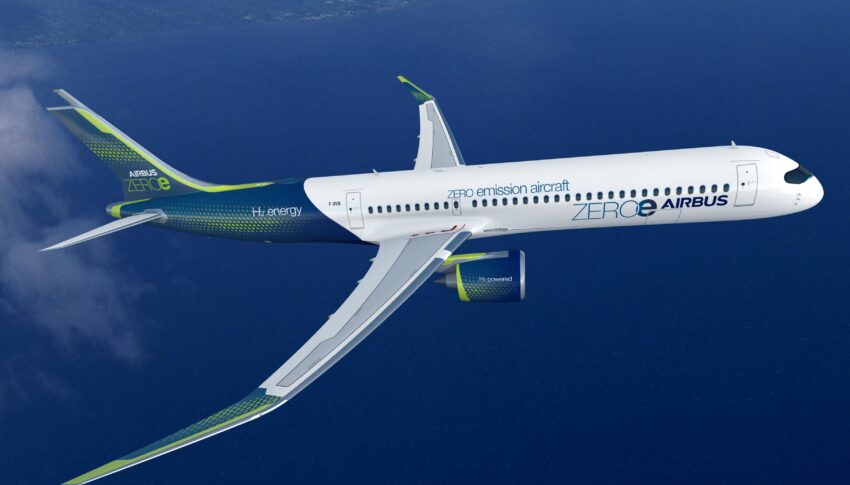Our latest article considers the hopes hydrogen offers for a sustainable future in aviation
Hydrogen is one of the great green hopes for a sustainable aviation industry. With Airbus’ ZEROe concepts and its new zero-emission development centres in France and Germany representing part of a strong push towards hydrogen in Europe, we sat down with Roland Gerhards, CEO of Hamburg’s ZAL Center of Applied Aeronautical Research, to get his perspective on the near- and medium-term futures for hydrogen.
The wider hydrogen world contains two separate kinds of technological advance: firstly, burning hydrogen in turbines that in many ways resemble traditional gas turbines, and secondly to produce aircraft powered by hydrogen fuel cells.
The ZAL entered into a development platform partnership in July with the Hamburg city government, Hamburg Airport, Lufthansa Technik and the German Aerospace Center (DLR) to test hydrogen technology in maintenance and ground operations process contexts.
In a hydrogen-turbine world, commercial hydrogen operations will require an ecosystem of fuelling, maintenance, repair, overhaul and ground ops, although that hydrogen-turbine world will be relatively recognisable compared with the current state of infrastructure: different tanks, different fuelling systems, different items to repair, but not a million miles away.
A commercial hydrogen world will require development of lighter-weight technology, particularly around components like tanks, which are at present very heavy compared with kerosene storage [PDF: A fact-based study of hydrogen technology] owing to the greater strength required.
Once the industry moves towards fuel cells, it will require a new way of thinking about thermal management, too, because fuel cells generate substantial amounts of heat, and using this heat rather than simply wasting it will be crucial to efficiency.
Both the hydrogen-turbine and fuel-cell worlds are likely to require differently shaped aircraft and therefore differently laid out airports and rethought ground services.
And, of course, the public has to be convinced by the answer to the ‘Hindenburg problem’: the almost-instinctive reaction to the very idea of hydrogen-powered aircraft. This shouldn’t be underestimated.
For the rest of the decade, aviation’s focus will be a substantial investment of both money and effort in building workable flying demonstrators, Gerhards predicts. Small-scale demonstrators in this category would include the ZeroAvia powertrain and the Deutsche Aircraft/H2FLY plans for a hydrogen-powered Dornier 328.
“I think we will see more of these demonstrators flying [from now] until 2030, getting larger and larger with more sophisticated fuel cell systems, or maybe hydrogen burning systems with gas turbines,” says Gerhards, noting that towards the end of the decade he wouldn’t be surprised to see something in the 5–20-seater range, or even 50-seater, but unlikely to be larger while the technology matures.
Around the 2030 mark, Gerhards predicts, something around the size of a turboprop carrying 70-90 passengers is likely to appear on the horizon, but says that achieving widescale commercial operations with such an aircraft by 2035 would be “quite a challenge”.
“I think we’ll see other aircraft manufacturers working on smaller aircraft models like the Dornier, or something in that similar size up to 50 people,” he suggests.
The hydrogen also has to be produced in a sustainable manner. Currently, what’s known as ‘grey hydrogen’ is produced from methane or coal. ‘Green hydrogen’, the goal, uses an electrolyser and renewable energy to separate water into oxygen bubbles on one side and hydrogen on the other. Its development, production, energy and infrastructure will need to be incentivised — whether as public/private sector investment, regulation, other incentives, or a combination of the lot.
Fundamentally, too, there will be competition for hydrogen across industries, and indeed the electricity to produce it in a green manner. The exact amount needed for aviation is still unclear, but Gerhards suggests the aviation requirement for any given country is likely to be similar to what is currently required in terms of aviation kerosene: likely somewhere in the single digit percentages for most developed countries.
Production, infrastructure and storage capacity are all limited too, says Gerhards. “We can only produce and handle a limited amount of fuels for the time being, say, and only by 2040, 2050, will we have a sufficient amount of hydrogen available for normal operations.”
That’s normal operations in the regional and shorthaul markets, mind.
“Intercontinental operations might be very, very difficult to achieve in the midterm future, let’s say to 2050, because these long range operations are very difficult with hydrogen,” Gerhards says. “I see a split: short range starting with hydrogen, and then long-range operations and intercontinental operations staying with sustainable aviation fuels.”
Indeed, the difficulties of long-range hydrogen are complex, which is one of the reasons why it is first being targeted at shorter range aircraft.
As with many of the larger problems humanity is facing in response to the climate crisis and the urgent need to decarbonise our economies, realising this sustainable future will require concerted effort from the industry, from the wider players in the infrastructure that supports it, and at governmental and intergovernmental levels to create a context where these innovations can take place.
Author: John Walton
Published: 19th August 2021
Join the Conversation
We are discussing this topic in Yocova ‘Challenges’ Area: Do you believe that hydrogen is the future of sustainable aviation – and if so when will this be achievable? We welcome your opinion and thoughts.





